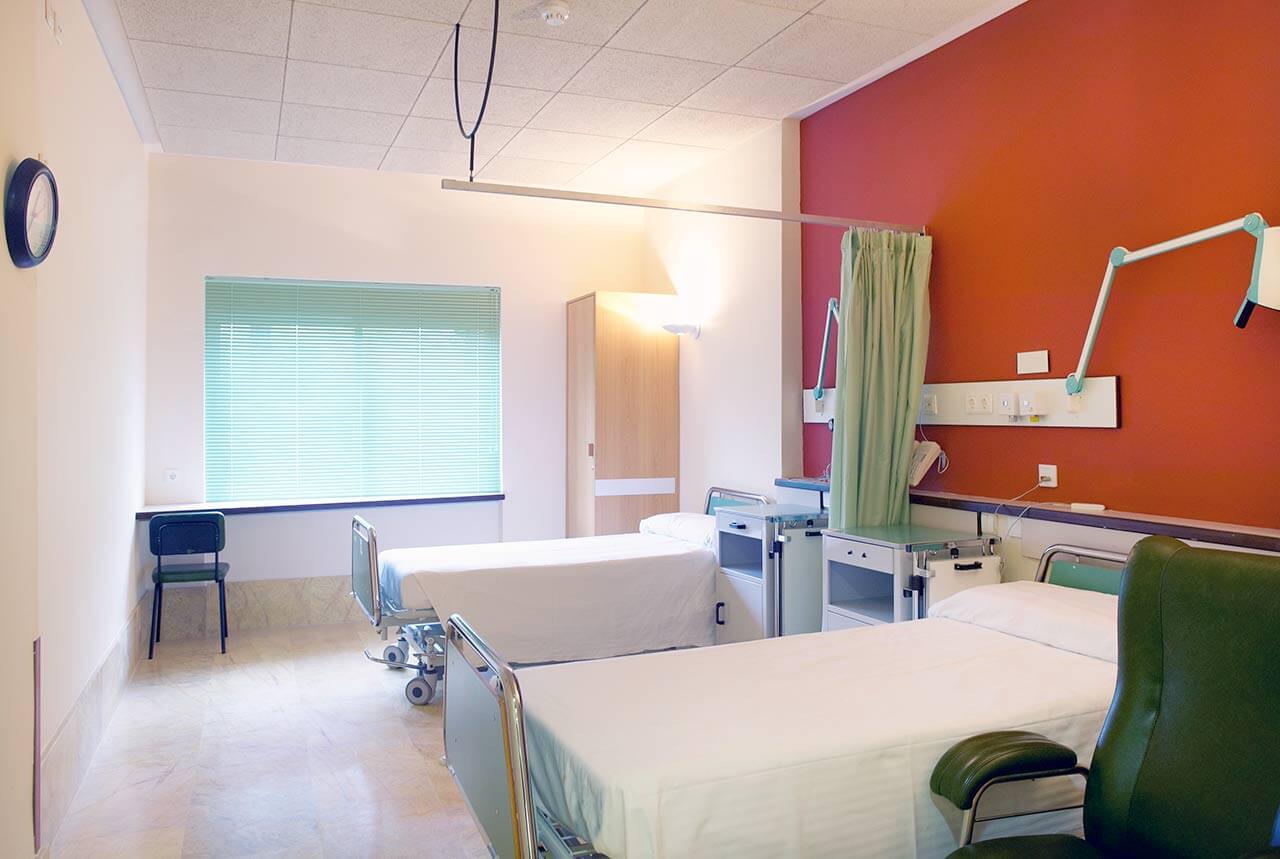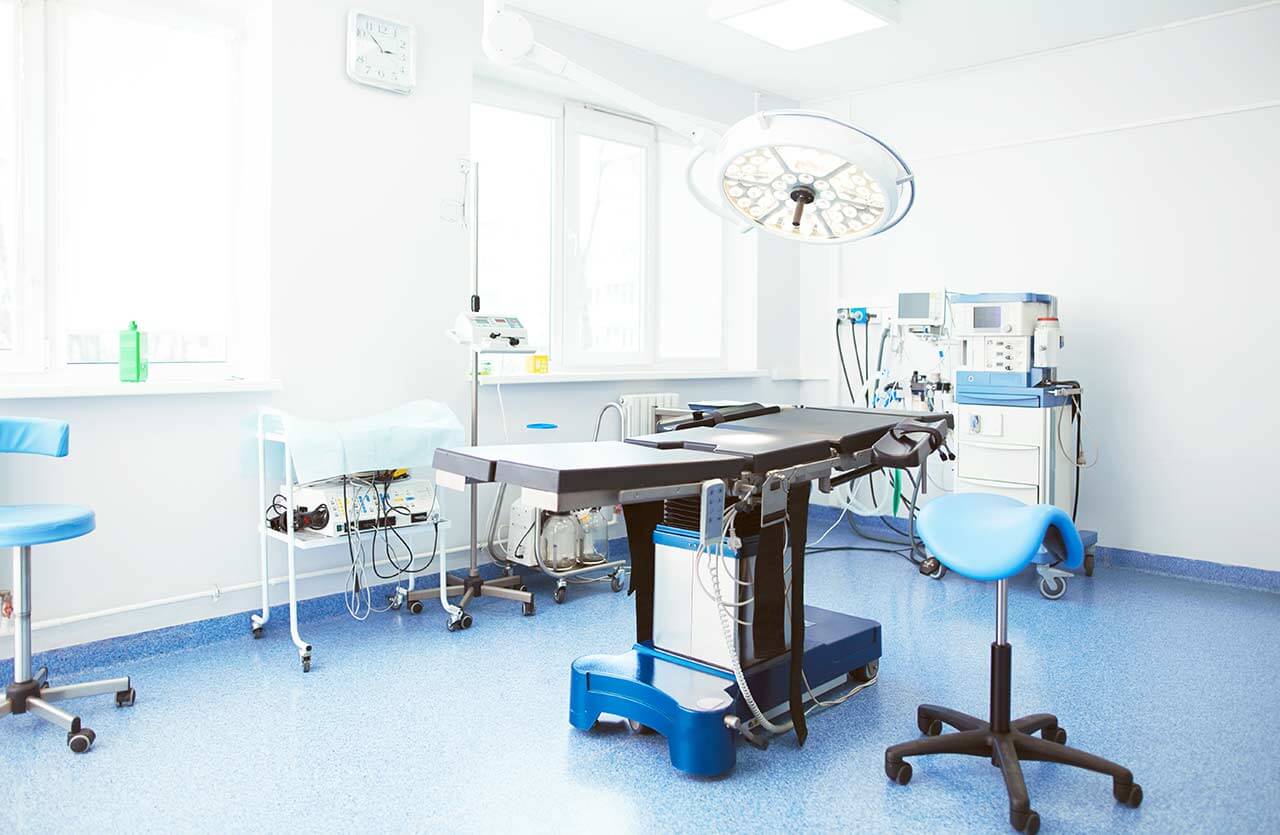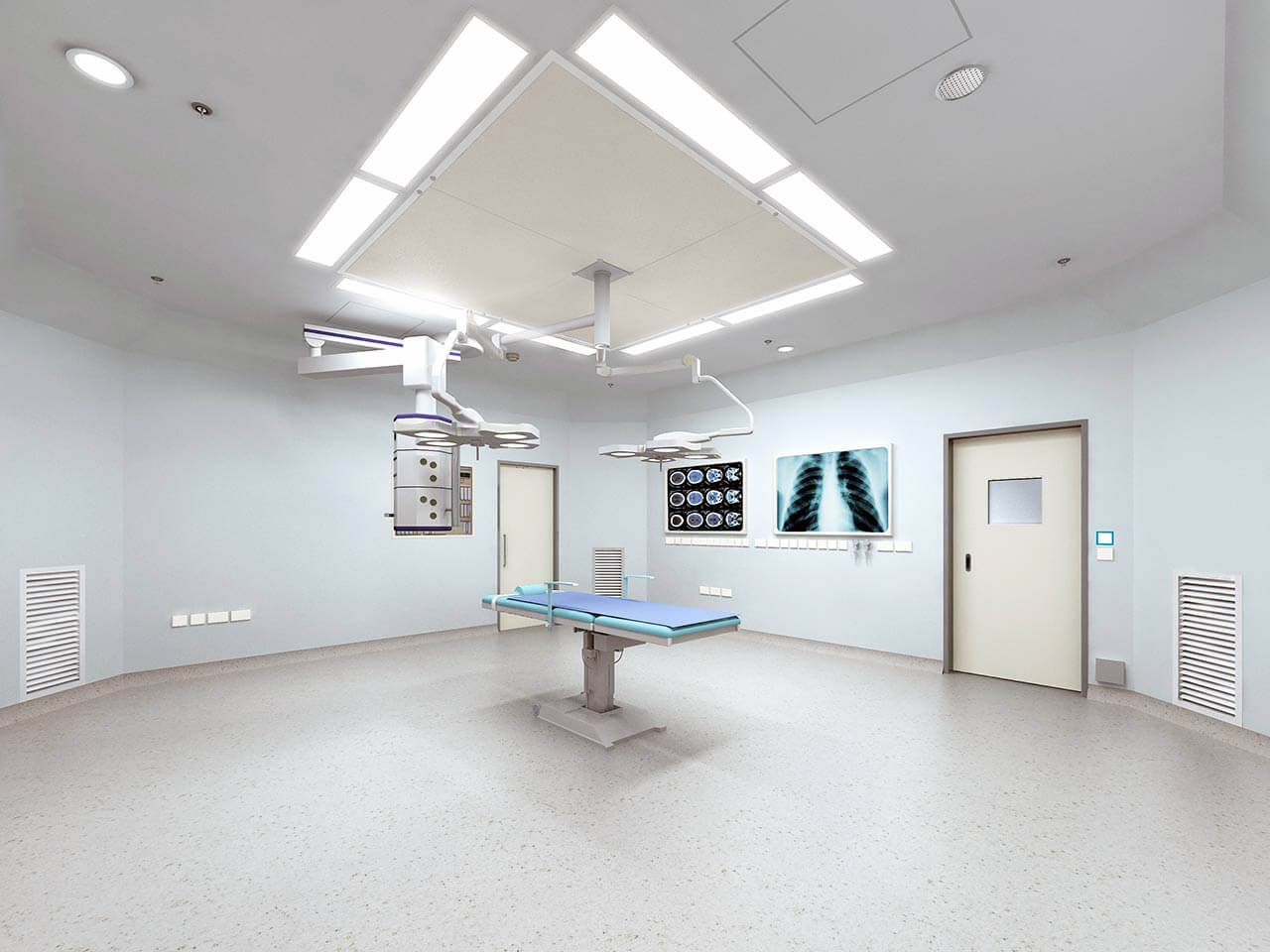
The program includes:
- Initial presentation in the clinic
- clinical history taking
- review of medical records
- physical examination
- laboratory tests:
- complete blood count
- general urine analysis
- biochemical analysis of blood
- TSH-basal, fT3, fT4
- tumor markers
- inflammation indicators (CRP, ESR)
- indicators of blood coagulation
- abdominal ultrasound scan
- CT scan/MRI or PET-CT of abdomen
- preoperative care
- cytoreductive surgery to remove visible tumors
inside the abdomen and HIPEC - histological and immunohistochemical
examination of removed tissues - symptomatic treatment
- cost of essential medicines
- nursing services
- stay in the hospital with a full board
- accommodation in a 2-bedroom ward
- elaboration of further recommendations
How program is carried out
During the first visit, the physician will conduct a clinical examination and go through the results of the available diagnostic tests. After that, you will undergo the necessary additional examination, such as the assessment of liver and kidney function, ultrasound scan and tomography of the abdominal organs. Based on the results of the examination, the physician will choose the surgical technique and the type of anesthesia. After that, preparation according to the preoperative standard will start.
Cytoreductive surgery begins with general anesthesia. The intervention is performed as open surgery, i.e. through the incision in the anterior abdominal wall, so that the surgeon can carefully examine the peritoneum and the surface of the abdominal organs. The surgeon removes affected by the malignant process ovaries, areas of the peritoneum and metastases in other internal organs. This stage of the operation can take several hours, since the overall effectiveness of the treatment depends on the completeness of the malignant tissues removal.
At the next stage of the operation, the surgeon inserts several catheters into the abdominal cavity. Through the catheters, a heated solution of a chemotherapy drug is pumped inside. The special system maintains the required temperature (42-43 degrees Celsius), pressure and circulation rate of the medicinal solution. The solution mechanically flushes out blood clots and remnants of malignant tissues, and a heated chemotherapy drug destroys micrometastases in internal organs and lymph nodes (micrometastases can’t be detected by the naked eye).
After 1-1.5 hours, the chemotherapy drug is removed from the abdominal cavity and the abdominal cavity is washed with saline. After that, the surgeon removes the catheters and sutures the incision of the anterior abdominal wall.
After the completion of the operation, you will be transferred to the ward of the intensive care unit, under the round-the-clock supervision of doctors and nurses. In 1-3 days after the operation, your drains will be removed and you will be transferred to a regular ward for further recovery. The whole treatment takes 10-12 days on average.
Finally, the attending physician will evaluate the results of control examinations, schedule the date of discharge from the hospital and give you detailed recommendations for further follow-up and treatment.
Required documents
- Medical records
- MRI/CT scan (not older than 3 months)
- Biopsy results (if available)
Service
You may also book:
 BookingHealth Price from:
BookingHealth Price from:
About the department
The Department of Gynecology, Mammology and Obstetrics at the St. Elisabethen Hospital Lörrach provides the full range of top-class medical services in the areas of its specialization. The department's patients can undergo preventive examinations, comprehensive diagnostics and treatment of various diseases of the female reproductive system. The department offers the services of a specialized Breast Center, which deals with the treatment of breast diseases, while a special focus is on cancer therapy. An integral part of the department's work is the provision of obstetric services – the medical facility has the status of a Level I Perinatal Center. Obstetricians cooperate closely with neonatologists, so if any complications develop during or after childbirth, newborns receive the necessary medical care. The department admits more than 4,000 inpatients and performs about 2,500 surgical interventions. More than 2,300 children are born in the department every year. The department has 60 beds for patient hospitalization. All conditions for highly effective treatment in a comfortable environment are created here. The department is headed by Prof. Dr. med. Michael Bohlmann. He is a competent specialist with long experience and excellent treatment results.
In the field of gynecology, the department's specialists carry out diagnostics and treatment of all diseases of the female reproductive system. Of particular interest is the treatment of female genital cancer: uterine, cervical, endometrial, ovarian and vulvar cancers. Women with benign and inflammatory gynecologic diseases can also receive medical care here. To treat gynecologic diseases, especially malignant ones, a surgical intervention is often required. The department's team of doctors widely uses low traumatic laparoscopic surgical techniques that provide rapid recovery and minimal pain. In addition, minimally invasive operations guarantee a good aesthetic result. The department's doctors also have vast experience in chemotherapy for female reproductive cancers.
The department's therapeutic options are complemented by conservative and surgical procedures for urinary incontinence as well as pelvic organ prolapse. After the diagnostics, each patient is prescribed a customized therapy, taking into account the particular clinical situation. In 85% of cases, properly selected therapy helps the patient to completely get rid of the problem or to achieve an improvement in the patient's condition. The department's gynecologists often manage to achieve good results in the treatment of urinary incontinence without resorting to surgery. Drug therapy, injection therapy, special therapeutic exercises to strengthen the pelvic floor muscles, electrical stimulation, and pessary therapy are used as conservative methods. Surgery is performed only in cases where conservative treatment options have exhausted their effectiveness. Pelvic organ prolapse is corrected with the use of low traumatic surgical reconstructive techniques.
In the field of mammology, the full range of breast diseases are diagnosed and treated. One of the most important focuses of work is breast cancer therapy – the department has been certified by the German Cancer Society and the German Society of Senology. As part of the Cancer Center Lörrach-Rheinfelden, the department offers effective breast cancer treatment that meets high international standards. Optimal treatment tactics are developed at interdisciplinary tumor boards with the participation of gynecologists, oncologists, radiologists, radiation therapists and other specialists. In severe clinical cases, doctors from other medical facilities are engaged in the therapeutic process. As a rule, an integral part of the treatment regimen is surgery for malignant tumor resection. The department's specialists strive to perform breast-conserving surgery. If the patient requires a mastectomy (breast removal), it is followed by reconstructive surgery to restore an attractive appearance of the breasts. The competence of the department's breast specialists also includes breast augmentation and reduction surgery for medical reasons. The health facility is rightly proud of its vast experience in the treatment of gynecomastia in men.
A separate area of work of the department is obstetrics. In this medical field, women are provided with high-quality care before, during and after childbirth. The department was awarded the title of the Level I Perinatal Center for the excellent quality of services. Its specialists have unique experience and expert knowledge in the management of high-risk pregnancies. The department has six delivery rooms with a certain design and color scheme. The furnishings of each room include a wide maternity bed, a stool, a special rope, a ball and other supplies. Some rooms also have a bath for water birth. The Intensive Care Unit for newborns is located in close proximity to the delivery rooms, which guarantees immediate care for the baby. Obstetricians support expectant mothers and help them to find the optimal position for childbirth. The department also has special family rooms where the father can spend time with the mother and the newborn.
The department's range of medical services includes:
- Gynecology
- Diagnostics and treatment of benign and malignant female genital diseases
- Diagnostics and treatment of inflammatory diseases of the female reproductive system
- Diagnostics and treatment of urinary incontinence
- Diagnostics and treatment of pelvic organ prolapse in women
- Mammology
- Breast-conserving surgery
- Primary and secondary breast reconstruction
- (Axillary) sentinel lymph node biopsy
- Axillary lymph node removal (axillary dissection)
- Breast augmentation and reduction for medical reasons
- Surgery to remove enlarged mammary glands in men (gynecomastia)
- Pain management
- Psycho-oncological care
- Obstetrics
- Comprehensive management of pregnancy, including high-risk pregnancies
- Childbirth: natural childbirth, water birth, C-section
- Postpartum care for mother and baby
- Other medical services
Curriculum vitae
Prof. Dr. med. Michael Bohlmann is the Head of the Department of Gynecology, Mammology and Obstetrics at the St. Elisabethen Hospital Lörrach. From 1994 to 2001, the specialist studied Human Medicine at the Faculty of Medicine at the Heidelberg University. Prof. Bohlmann worked in various hospitals in Mannheim, Bern, Giessen, Luebeck and Tuebingen. Before holding the position of Head Physician at the St. Elisabethen Hospital Lörrach, Dr. Michael Bohlmann worked as Senior Physician in the Department of Gynecology and Obstetrics at University Hospital Mannheim. The specialist had his habilitation at the University of Luebeck, after which he received his professorship. The research work was devoted to the study of pregnancy complications. One of the priority fields of Prof. Bohlmann's clinical practice is the treatment of cancer of the female reproductive system. The doctor is also distinguished by his exceptional professionalism in the field of sparing minimally invasive surgery.
Photo of the doctor: (c) St. Elisabethen-Krankenhaus gGmbH
About hospital
The St. Elisabethen Hospital Lörrach is an ultramodern medical facility specializing in the provision of competent medical care to adults and young patients. The hospital is an academic medical facility of the Albert Ludwig University of Freiburg, which gives it access to the very latest advances in science and medicine. The hospital's main areas of specialization include gynecology and obstetrics, mammology, pediatric and adolescent medicine, as well as otolaryngology and urology. The specialists of the hospital annually admit about 11,500 inpatients, and more than 43,000 outpatients. The medical complex performs more than 7,500 surgical interventions of varying complexity, and about 2,400 babies are born here every year. The above-mentioned data demonstrate the reputability of the hospital in the European medical arena and the high credibility of patients.
The hospital staff consists of more than 580 employees who provide patients with high-quality medical care in accordance with current international standards. At the same time, doctors and nurses are always friendly, show a humane attitude towards the patients' life situation and support them in every possible way during the entire process of recovery. Clinical practice is based on the use of modern medical technology, reliable classical and innovative treatment methods that are recognized throughout the world and guarantee the maximum effectiveness of therapy. The hospital strictly observes hygiene and safety standards, which also plays an important role in the success of treatment.
The goal of all medical staff is that patients, regardless of their origin, religion or social status, feel safe here and find understanding of their personal needs. Doctors and nurses surround the patient and his relatives with care, devote enough time to personal communication and discussing the nuances of treatment. In addition, the doctors working in the hospital get along well with children and easily establish trusting relationships with them, which positively affects the therapeutic process and the child's psycho-emotional state.
Photo: (с) depositphotos
Accommodation in hospital
Patients rooms
The patients of the St. Elisabethen Hospital Lörrach live in comfortable single and double rooms. Each patient room has an ensuite bathroom with shower and toilet. The shower comes with a set of toiletries and towels. Towels are changed every day. The furnishings of the patient room include a comfortable automatically adjustable bed and a bedside table for storing personal belongings. The room also has a wardrobe, table and chairs, TV and radio.
When requesting additional services during registration at the hospital, each patient receives headphones for free, with which they can listen to the radio and watch the LCD TV placed near the bed.
Meals and Menus
The patients of the hospital are offered not only balanced and healthy, but also very tasty food. The menu changes weekly. Patients can choose between two full menus, light snacks and vegetarian options. In addition, the hospital offers a dietary menu and meals for Muslim patients.
Those patients who order additional services are offered a choice of five main courses and side dishes. In addition to breakfast, lunch and dinner, these patients have daily afternoon coffee with pastries. Fresh fruits and juices are also offered on weekdays.
In addition, the ground floor of the hospital houses a cozy cafe called "Eli", the doors of which are open to both patients and their accompanying persons and visitors. The menu of the cafe features a wide range of hot and cold drinks, cakes, snacks, sandwiches and hot dishes. In the warm season, cafe visitors like to sit on a large outdoor terrace overlooking the courtyard of the hospital and the playground. The cafe also has a play area for children.
Further details
Standard rooms include:
Television
Almost all of the hospital's patient rooms are equipped with TVs, and all rooms have radios, which are free to use. However, the patient needs headphones, which can be bought at the reception desk.
Newspapers
Optional service patients receive a daily phone card with a start credit as well as an actual newspaper.
Religion
The hospital offers pastoral care. The hospital's own private chapel near the entrance hall is available for you during the whole day. The chapel and a special religious visit for prayer and retreat are open to followers of all religious denominations and worldviews.
Accompanying person
During the inpatient program, your accompanying person may stay with you in your patient room or at the hotel of your choice.
A person accompanying a child under the age of 6 may stay with him around the clock. If your child is in the intensive care unit, you may stay in the parent's room.
Hotel
You may stay at the hotel of your choice during the outpatient program. Our managers will support you for selecting the best option.




